 |
|
|
Last Modified:
? ? ? ? ? ? ? ? ? ? ? ? ? ? ? ? ? ? ? ? ? ? ? ? ? ? ? ? ? ? ? ? ? ? ? ? ? ? ? ? ? ? ? ? ? ? ? ?
|
|
|
Homepage / Publications & Opinion / Archive / Articles, Lectures, Preprints & Reprints Money, Chips & Bits Peter Cochrane Prologue "Heavier-than-air flying machines are impossible" "(Television) won't be able to hold on to any market it captures after the first six months. People will soon get tired of staring at a plywood box every night" "I think there is a world market for maybe five computers" "There is no reason for any individual to have a computer in their home" "640K ought to be enough for anybody." During the industrial revolution railways wiped out barges and canals, the car wiped out the train, and aircraft sank the big liners sailing the North Atlantic. But more significantly, electronics, thermionic tubes, transistors, integrated circuits, satellites and optical fibre arrived to give us telephones, radio, TV, computers and networks of incredible performance, and all unimaginable only 50 years ago. Moreover, these are all at a cost that everyone can afford, and they have totally transformed our business and social lives in less than one human generation. We have seen the systematic destruction of old industries by the arrival of the new over millennia. And today we look into our crystal ball and try to gauge and predict the implications of the information revolution. Without doubt the internet looks set to be the biggest paradigm buster we have ever seen. It is touching and changing everything we do, whilst enabling a new and vigorous economy of bits. In this world entire economic sectors and industries are being destroyed or radically transformed in just a few years. In some cases the changes being enacted are so radical, we might ask; is this the end of the old financial world, its institutions, and even money? The Plot  Fig 1. Internet Hosts - Log Scale  Fig 2. Internet Hosts - Linear Scale Bits & Chaos For telecommunications networks coffee is now just one of many strange attractors. At a large conference no one is using a mobile phone during the proceedings, they are listening to the speakers, until coffee arrives at 10.15 that is. Within minutes over 100 mobile phones are out and people trying to make calls. Not surprising then that the cellular phone site falls over and people are disappointed. A few weeks ago a ladder fell of the back of a builders truck onto the fast lane of the M25. Every vehicle that swerved to miss the ladder tried to call 999, and the emergency service was disabled for over an hour until the ladder was removed. Plane and train cancellations, traffic jams and budget changes to the price of petrol all constitute very new strange attractors. Similar crowding and swarming behaviours are also visible at ATMs, banks, and stores when the sales start. The internet seems to have an infinity of strange attractors that promote chaotic action on a huge scale. Within minutes of the latest Star Wars Movie site going live it was receiving thousands of hits per hour. For weeks it was completely log jammed, and so were or all the arterial routes leading to it. Let us put some dimensions to all this. The old telephone network was engineered to cope with you and I making an average of 3 telephone calls every day of 3 minutes duration. The aggregation of millions of phone lines saw a peak-to-mean traffic ratio of around 3 - 4. On the internet things are far more volatile with reported peak-to-mean ratios of over 1000. Fig 3 gives a sample of activity at one  Fig 3. Net Visitors Come in Packs Adam Smith got IT Wrong The Bit Economy  Fig 4. Internet Growth Eclipses the Telephone Network and the GDP? Selling More  Fig 5. USA E.commerce Revenues Gross Bit Product 'For investors it is the consummate measure of economic activity because it dictates how investments will perform. The stock market likes to see healthy economic growth because that translates to higher corporate profits. The bond market doesn't mind growth but is extremely sensitive to the economy growing too quickly and paving the road to inflation. By tracking the GDP, investors will know what the economic backdrop is to their portfolios'. This seems to be based more on doctrine than any practical basis. The definition of GDP is delightfully varied, but broadly falls inside the following envelope; 'A measure of the total production and consumption of goods and services - the market value for all final goods and services produced within a nation in a given time period. Intermediate goods such as plastic, glass, wood, cotton, etc are not counted since they are not in their final state. Including only final goods and services prevents double counting and avoids a GDP overstatement. Final goods include household purchases since these items are not used to produce other goods and services. GDP consists of four key components: Consumption (C), Investment (I), Government (G), Net Exports (NE)'. So the: From any system design stand-point it is hard to see how the economy of our planet could be accurately defined, or be even remotely indicated, by a single one-line linear equation. Where are the black, grey and bit economies in all of this? For sure they are very real and very significant, and in the case of the grey and bits, growing very fast. From a practical standpoint it seems that the GDP should be principally defined and measured in terms of some entropic measure related to the transformation of materials and bits. Their actual and final place, method, and mode of consumption may turn out to be a secondary effect in the overall rating. The accepted definition and formula above (1) seem to fall far short of the mark, and I suspect that the true GDP is actually tracing some exponential curve like Moore's Law for chip development and performance. If this is the case economists can expect some serious repercussions from sticking with an 18th Century perspective and not embracing the Gross Bit Product. One day they may find their world has gone, along with the significant tax revenues it generates. If so, it will have been replaced by a bit economy growing at an exponential rate. 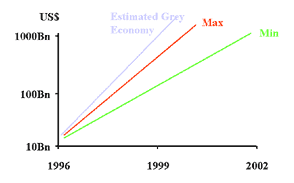 Fig 6. Internet Economy Growth E.farming In the USA money is available to do almost anything, but there is a shortage of good ideas and people. Their solution has been to comb the world and migrate the people into the USA, as a result Silicon Valley is full of Europeans and Asians. This is how Victorian England was - rich, confident, and attractive to people willing to risk everything to create the new. The latest rise of the UK Economy offers an opportunity to realise new wealth in new E.markets. What is missing is the vision to create the right environment and money availability. A young MIT graduate recently raised $25M to start a new company, and his chances of success are very high. In the UK he would be lucky to get $0.25M and his chance of failure would be almost certain - he would simply run out of money and be starved of support. The long term success rate for new start up E.businesses is ~2%. So to get a success means 100 or more new start-ups, which by USA standards would require a fund in excess of $1Bn. But the payback could be on the scale of Yahoo, Amazon or Ebay with valuations of $6Bn in 5 years. It is unlikely that a single UK institution could afford such a risk, or avoid the temptation to meddle with the operation as it developed, and thereby predicate failure. A new success focused model would see 10-20 large companies clubbing together to invest 5-10% each in a single start-up. This would create a capital without interference environment. Also, the start-up could tap management, financial, technical, market, and contact support from the hosts companies. Each start-up could also be directed to trade amongst each other to form a virtuous circle of dependency. Given that the USA appetite for people and expansion, we should consider the risks of not doing this. The words technological imperialism spring to mind. They no longer have to attract people and ideas to the USA - they are all on line and available for the picking - just like farming. New Rules 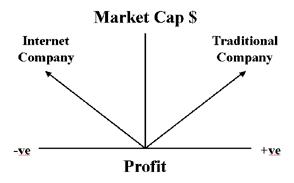 Fig 7. Company Company Operational Modes 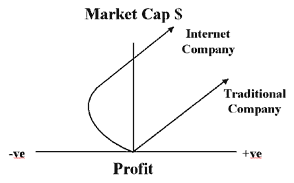 Fig 8. Internet Company Long Term Market Cap 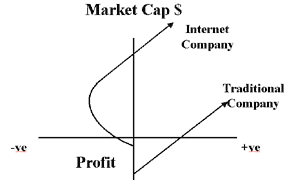 Fig 9. Company Initial Financing Looking at all the preceding evidence we might conclude that the following general laws apply in this new business domain:
In a stable world we would build up a wealth of experience that has value and is vital to our survival and prosperity. But in a world that is highly unstable and changing fast it is generally the case that experience can be detrimental or even dangerous. So we might construct a Fitness Function for a company that includes all of the positive and negative parameters related to the above Net Economy Laws. This is shown, in a truncated form, in Fig 10. Notice that experience is on the bottom line! The Internet has disintermediated many businesses by breaking the old paradigms, and by adopting new and counterintuitive business models. Non of our past experience predicted Yahoo, Ebay or Amazon.  Fig 10. Company Fitness Function The Cost of Money 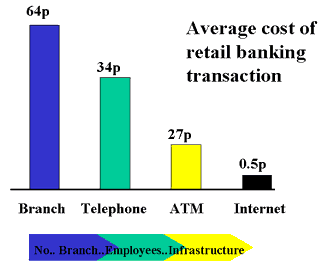 Fig 11. The Law of Diminishing Returns Banking Outsourcing Logistics As a direct result of money moving into the bit world we will see an exponential increase in the transaction costs in the world of atoms - money and cheques will become even more expensive - as will a trip to the bank. Whilst cash, cheques and cards have managed to coexist, bit based trade is unlikely to be that tolerant. Bit Barter Living in a village, town or city gives opportunity for a black economy of people trading goods, skills, services and assistance on the nod. However, it is an economy limited by the bounds of word of mouth advertising and communication. So it tends to be confined to friends and acquaintances - people who trust each other. In this context we should recognise that financial institutions overtook and replaced large-scale barter on the basis that they provided a trusted mediation mechanism. Money replaced pigs, goats, corn, sweat and toil. Along with this trust transition to money came the standardisation of price and the efficiency of the 'haggle free' market. The wheel turns full circle, and centuries after the invention of money and the rise of financial houses, a new-world has emerged with the possibility of global barter. How much easier it is to advertise and trade on the net where there are no frontiers, barriers, or limits. All bits are potentially for sale, for more and different bits. Even atoms and services can be traded. Inspect, try and test the goods on the net, agree a trade and send by snail mail. Need some advice or a service? Access it all on-line and pay by bits or goods. Somewhere on the planet, someone has what you want and needs what you want to be rid of. Only the advertising and mediation process has stopped this being affected. But now it is available on the net. The global black economy is already reckoned in the £100s of billions. Here then is a mechanism for it to get even bigger. Will we see electronic trading posts - frontier style - with human agents haggling in Bytes? Or will we be more relaxed in the bit world, and be driven by perceived quality and need rather than raw quantity and availability? Duplication, pirating, modification and additions to soft products will then have a whole new meaning. How do you collect taxes to support the infrastructure of a nation when no money is exchanged, or is in such small increments you cannot afford to collect or police the system? With micro-payments, a million transactions of 1p is bad enough, but taxing each exchange at 17% is impossible. Trading bits goods and services with no means of interception and recording is even worse. This could become a macro-economy of micro things, well beyond any fiscal process yet in place or conceived. Perhaps we have to think: Outsourcing 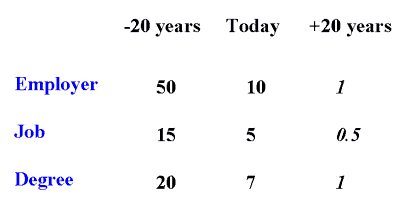 Fig 12. Some Half Lives I recently met a young lady who had graduated, worked for 18 months in a major company, and then gone freelance. Her current, and multiple simultaneous employers, will total 35 by year end. Who should she turn to for assistance? She needs a bank with all the data and expertise to hand so this growing problem can be reduced to a software package. She needs real time business management as much as a company. Legacy Buying everything from socks to gasoline, and information processing by humans is the limiting factor. What should we be doing? Well a single chip on a smart card can now store all our vital information and much more. Our medical records, insurance, passport, bank details and employment history could be written into the one device. Add a short range wireless transmitter-receiver, and we have a personal transponder - just like an aircraft. We can be identified and information accessed or updated with no physical connection. A very low cost printable chip can also be used to replace the bar codes on all our goods from Cornflakes to beans, books and trousers. So in principle, all our problems are over. Just wander into a store, collect what you want, and walk out. The recognition of us and all the goods can be automatic, along with the accounting and stock control, plus of course the exercising of all our insurance options. We are then the masters of our own delay, the world goes at our pace, and finance is as invisible as the air we breath.  Fig 13. Machines Overtake Mankind The speed at which this is all happening can be gauged by the fact that today 40% of all the bit traffic on our networks is between machines and not people - Fig 13. By the year 2010 this figure will have moved up to 95%, and there will be far more machines on-line than people. Everything we buy, own and use will be on-line, and they will afford us many new freedoms, and probably enable the next move beyond the Internet. Somehow I don't think the machines will see money and finance in the same way we do. Word Count = 4521 |
|
||